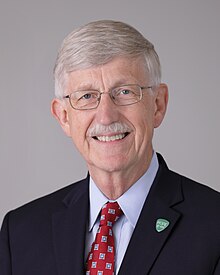A request that this article title be changed to BioLogos is under discussion . Please do not move this article until the discussion is closed. |
 | |
| Formation | 2007 |
|---|---|
| Legal status | Non-profit |
| Headquarters | Grand Rapids, Michigan, United States |
President | Kristine Torjesen |
| Website | biologos |
The BioLogos Foundation is a Christian advocacy group that supports the view that God created the world using evolution of different species as the mechanism. [1] It was established by Francis Collins in 2007 after receiving letters and emails from people who had read his book, The Language of God . [2] The primary audience was Christians in the beginning, but Collins as well as later leaders of the organization have sought to engage with scientific skeptics as well as general audiences invested in biological science.
Contents
BioLogos affirms evolutionary creation as a core commitment. [3]
